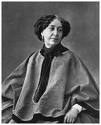George Sand 1804 - 1876
October 30, 2008
 Amandine Aurore Lucile Dupin, later
Baroness Dudevant 1804 – 1876, best known by her pseudonym
George Sand was a French
novelist and feminist.
Amandine Aurore Lucile Dupin, later
Baroness Dudevant 1804 – 1876, best known by her pseudonym
George Sand was a French
novelist and feminist.
George Sand was a patient of homeopath Jean Jacques Molin, and she knew Melanie Hahnemann (she lived around the corner from Melanie Hahnemann). She was a friend of Franz Liszt and Marie, Comtesse d’Agoult, and the lover of Frederic Chopin.
George Sand also had an affair with Alfred de Musset who was a close friend of Melanie Hahnemann, and Alfred de Musset’s brother Paul de Musset was a patient of homeopath Antoine Henri Petroz.
Sand’s father, Maurice Dupin, was the grandson of the Marshall General of France, Maurice, Comte de Saxe, as well as a distant relative of Louis XVI. Her mother, Sophie-Victoire Delaborde was a commoner.
Sand was born in Paris but raised for much of her childhood by her grandmother, Marie Aurore de Saxe, Madame Dupin de Franceuil, at her grandmother’s estate, Nohant, in the French region of Berry (See House of George Sand). She later used the setting in many of her novels.
In 1822, at age 19, she married Baron Casimir Dudevant (1795–1871), illegitimate son of Jean-François. She and Dudevant had two children: Maurice (1823–1889) and Solange (1828–1899).
In early 1831 she left her prosaic husband and entered upon a four or five year period of “romantic rebellion.” In 1835 she was legally separated from Dudevant.
Sand’s reputation came into question when she began sporting men’s clothing in public — which she justified by the clothes being far sturdier and less expensive than the typical dress of a noblewoman at the time. In addition to being comfortable, Sand’s male dress enabled her to circulate more freely in Paris than most of her female contemporaries could, and gave her increased access to venues from which women were often barred — even women of her social standing.
Also scandalous was Sand’s smoking tobacco in public; neither peerage nor gentry had yet sanctioned the free indulgence of women in such a habit, especially in public (though Franz Liszt’s paramour Marie, Comtesse d’Agoult affected this as well, smoking large cigars). These and other behaviors were exceptional for a woman of the early and mid-19th century, when social codes—especially in the upper classes—were of the utmost importance.
As a consequence of many unorthodox aspects of her lifestyle, Sand was obliged to relinquish some of the privileges appertaining to a baroness — though, interestingly, the mores of the period did permit upper class wives to live physically separated from their husbands, without losing face, provided the estranged couple exhibited no blatant irregularity to the outside world…
Sand conducted affairs of varying duration with Jules Sandeau (1831), Prosper Mérimée, Alfred de Musset (summer 1833 – March 1834), Louis Chrystosome Michel, Pierre François Bocage, Félicien Mallefille and Frederic Chopin (1837–47).
Later in life, she corresponded with Gustave Flaubert. Despite their obvious differences in temperament and aesthetic preference, they eventually became close friends.
She was engaged in an intimate friendship with actress Marie Dorval, which led to widespread but unconfirmed rumors of a lesbian affair.
In Majorca one can still visit the (then abandoned) Carthusian monastery of Valldemossa, where she spent the winter of 1838–39 with Frederic Chopin and her children. This trip to Majorca was described by her in Un Hiver à Majorque (A Winter in Majorca), published in 1855.
Frederic Chopin left her two years before his death, because of a family disturbance wherein he supported her daughter Solange’s marriage choice, which had caused Sand to disown the daughter…
George Sand died at Nohant, near Châteauroux, in France’s Indre département on June 8, 1876, at the age of 71 and was buried in the grounds of her home there.